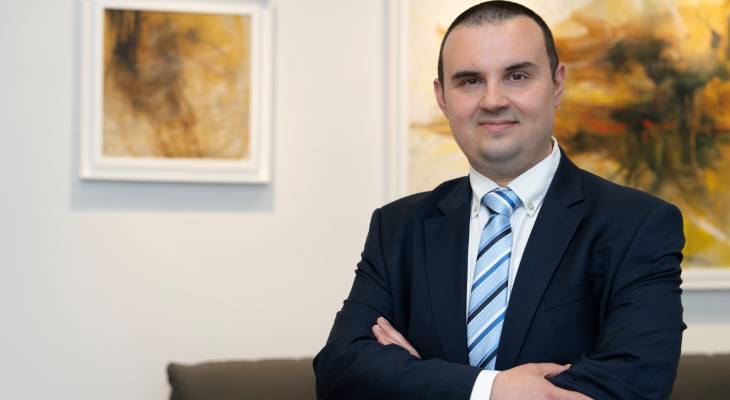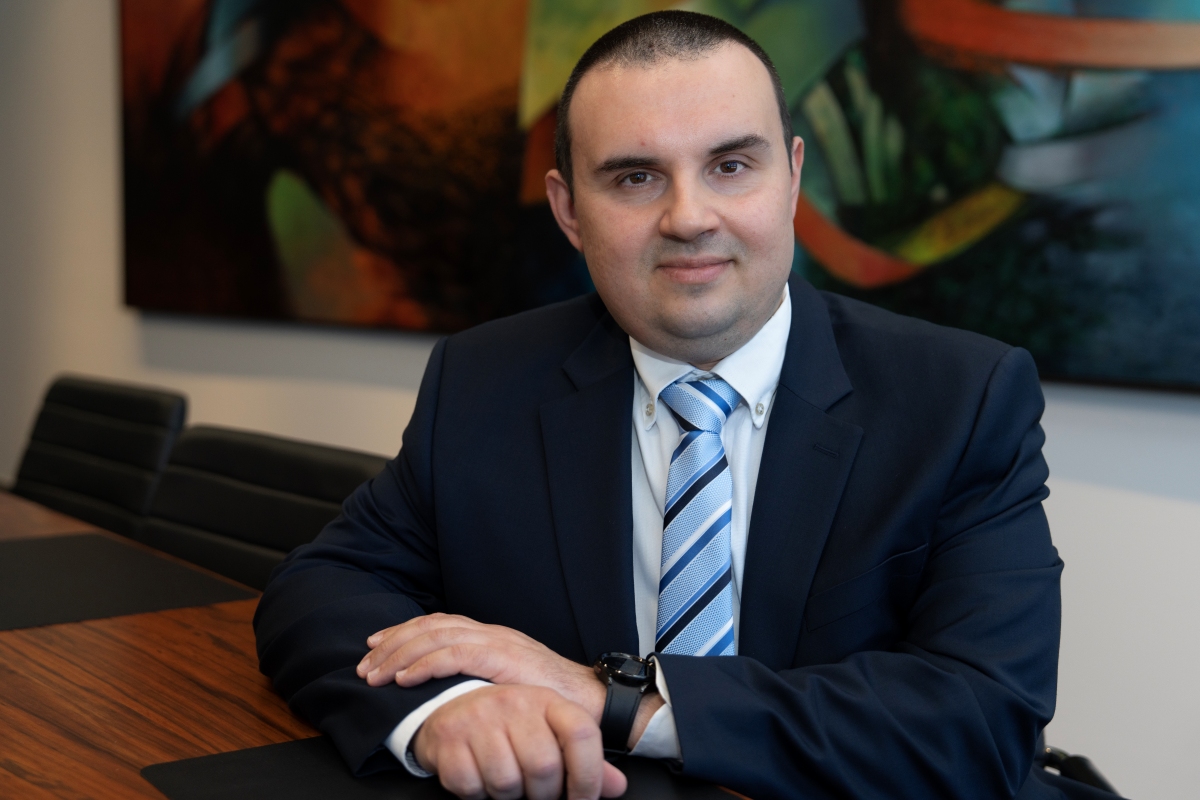Over the past twenty years, the global financial ecosystem has weathered a series of profound disruptions, from the 2008 financial crisis to the unprecedented challenges of the COVID-19 pandemic and ongoing geopolitical instability. Each of these events has added new layers of complexity to the banking sector, prompting a wave of regulatory reforms designed to fortify institutional resilience and enhance risk management frameworks.
In this evolving environment, mere reactivity is no longer sufficient. Banks like the Bank of Valletta (BOV) have had to elevate their approach, embracing sharper strategic vision, enhanced agility, and a proactive, forward-thinking mindset to navigate uncertainty and seize emerging opportunities.
Few people understand these financial realities better than Kevin Cardona. After 24 years with BOV, he took on the role of Chief Financial Officer in March 2024 following a career that has spanned everything from credit portfolio management to risk oversight and strategic business planning. Today, he chairs the bank’s Asset and Liability Committee and sits on both the Executive Committee and is in attendance for the Board of Directors meetings, with a wide remit that includes financial planning and reporting, budgeting, forecasting, liquidity management, and overall financial health.

As Chief Financial Officer, Mr Cardona has played a pivotal role in steering BOV toward greater financial resilience by reducing its exposure to short-term market volatility. A cornerstone of this effort has been a deliberate rebalancing of the bank’s balance sheet – shifting away from short-term, rate-sensitive assets in favour of longer-term, income-generating investments.
“This strategic shift was very much a response to the evolving economic and interest rate environment,” Mr Cardona explains. “At one point, nearly 38 per cent of our interest-earning assets were concentrated in short-term instruments. While this provided flexibility, it also left us highly exposed to fluctuations in Euribor and other variable market rates.”
This exposure meant that even a modest movement in interest rates – say, 25 basis points – could significantly impact the bank’s earnings. To mitigate this, over the last years, BOV undertook a drive of reallocating capital into longer-term instruments such as sovereign bonds and high-quality treasury assets.
The result has been a marked reduction in earnings volatility. In 2021, a one per cent shift in interest rates would have caused a €52.4 million swing in interest income and operating profitability. By 2024, that sensitivity had been reduced to €19 million – demonstrating the effectiveness of the bank’s proactive approach to balance sheet management and long-term financial planning.
Through its strategic balance sheet rebalancing and more sophisticated management of interest rate exposure, BOV has successfully insulated both its earnings and its clients from the disruptive effects of market volatility. This measured approach, particularly the decision not to fully pass through interest rate changes, has helped shield borrowers from abrupt financial shocks, reinforcing the bank’s role as a stabilising force in Malta’s financial ecosystem.

The results speak for themselves. Despite a turbulent global environment, BOV’s loan book reached record highs for two consecutive years. In 2024, the bank achieved unprecedented levels of commercial loan sanctioning, with growth not only in traditional sectors such as real estate and hospitality, but also in emerging industries like ICT services. This reflects BOV’s commitment to supporting a diversified and forward-looking economy, while maintaining a healthy and resilient credit portfolio.
“This type of diversified growth plays a vital role in supporting national economic momentum,” Mr Cardona notes. “It enhances Malta’s resilience and stability, particularly during periods of global financial uncertainty.”
Further building on its confidence in the local market, in June of this year, BOV launched a new bond issue designed to create long-term value for investors. “This is the second series under our €250 million programme,” explains Mr Cardona. “We initially aimed to raise €100 million, with the strong demand leading to the full use of the over-allotment option to €150 million.”
Through a dedicated company announcement on the 13th June, the bank announced that the that the initial offer of €100 million in Series 2 Tranche 1 Bonds has been fully subscribed and that the bank has exercised the Over-Allotment Option in full, marking one of the largest ever on Malta’s capital market. The five per cent unsecured subordinated bonds, maturing between 2030 and 2035, were issued under the bank’s €250 million Euro Medium Term Bond Programme and were met with overwhelming investor interest.
The offer, which opened on 9th June 2025, was fully subscribed well ahead of the scheduled closing date. BOV received over 4,200 applications amounting to €182.8 million in demand, prompting the full exercise of the €50 million overallotment option.
“This issuance forms part of BOV’s broader capital strategy, aimed at strengthening its Tier 2 capital, supporting future growth, and enhancing long-term financial resilience. It complements other initiatives such as a bonus share issue and a proposed share buyback programme, reinforcing the bank’s commitment to shareholder value and market stability,” says Mr Cardona.
Alongside the bond issue, BOV has, over the last months, also unveiled two additional initiatives aimed at rewarding shareholders and strengthening its position on the Malta Stock Exchange. These include a proposed share buyback programme and a bonus share issue.
The share buyback, currently awaiting regulatory approval, would see the bank repurchasing some of its own shares from the market. “The main goal here is to improve trading activity and market liquidity,” explains Mr Cardona. “It gives shareholders more flexibility, especially in a market like ours where volumes can be quite limited.”
Importantly, the repurchased shares won’t be cancelled but retained as treasury stock that can later be used for future shareholder distributions or employee schemes. The programme will be carefully managed under strict policy guidelines and participation will be entirely voluntary.
This initiative forms part of a broader capital strategy that also includes a bonus share issue, designed to reward long-standing shareholders and reinforce investor confidence. “We issued one new share for every ten held,” explains Mr Cardona. “It’s a tangible way of recognising shareholder loyalty while signalling our confidence in the Bank’s long-term growth trajectory.”
Together with the successful €150 million bond issuance, a rebalanced balance sheet, and a proposed share buyback programme, these measures reflect BOV’s strategic commitment to capital optimisation and sustainable value creation. Collectively, they underscore the bank’s confidence in Malta’s economic resilience and its own role as a systemic anchor within the local financial ecosystem.
“On the economic front, we are beginning to see signs of stabilisation,” Mr Cardona observes. “Local economic growth is normalising at long term averages, inflationary pressures are easing, and interest rates are gradually settling, particularly in Malta, where GDP forecasts remain robust.”
However, he is quick to temper optimism with prudence. While the outlook is improving, global risks persist, from geopolitical tensions to elevated sovereign debt levels in certain markets. “The environment is more balanced than in recent years, but continued vigilance remains essential,” he adds.
“For us, it’s about being prepared,” Mr Cardona says. “We’re building stability into the bank, not just to navigate uncertainty, but to support growth, inspire confidence, and stay focused on the long game.”
This cautiously optimistic outlook coincides with a pivotal phase in BOV’s 2024–2026 strategy cycle, which is championing a clear commitment to long-term resilience, innovation, and value creation.
A major focus area is digital transformation. From modernising online platforms to strengthening cybersecurity and leveraging data analytics, BOV is laying the groundwork for more seamless, secure, and efficient customer experiences. At the same time, its ongoing optimisation of the balance sheet is expected to deliver greater earnings stability and shield against interest rate swings.
Equally important is the bank’s growing emphasis on environmental, social, and governance principles as well as sustainability, which Mr Cardona points out is not only good for society but also increasingly important to investors and partners. Add to this its focus on shareholder value through dividends, bonus shares, and a buyback programme, and it’s clear BOV is thinking about growth in a broad, inclusive way.
“Our strategy is very clear at BOV,” Mr Cardona concludes. “It’s about building a holistic ecosystem where every part of the bank works together to support long-term stability and sustainability for our clients, for businesses, and for Malta’s economy.”
Main Image:
